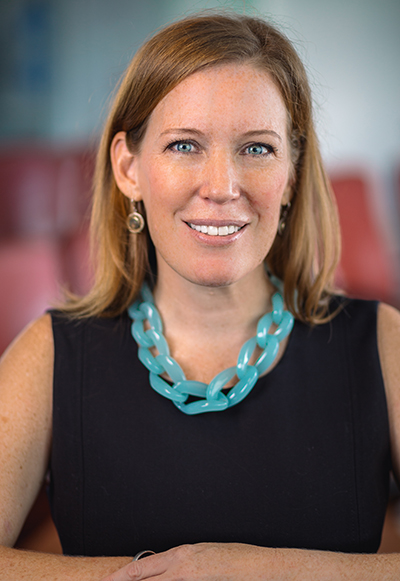An Auburn graduate and the Harlem Children’s Zone fight for Central Harlem’s citizens during COVID-19 pandemic and civil unrest.

This year has presented its fair share of struggles for the world. While some have found defeat in the struggles, others have found strength. One particular group that has honed in on its available resources is Harlem Children’s Zone, a nonprofit organization spanning 97 blocks in Central Harlem, New York City. And playing a part in the organization’s success is Auburn graduate Karen Sodomick ‘93.
When Sodomick joined Harlem Children’s Zone (HCZ) a year ago, she was thrilled and humbled to partner with an organization known to educators and policymakers all over the world. In the 1990s, HCZ’s founder and former CEO, Geoffrey Canada had a grand vision. He imagined an organization that offered a breadth of services to its vulnerable citizens to break the cycle of poverty in a long-challenged community. From education, after-school programs and food delivery services to facilitated access, healthcare and more, over twenty years later HCZ is considered the pioneer of “place-based services” with a generation of proof.
Hired as HCZ’s first-ever chief communications officer, Sodomick uses her background of contributing and leading communications departments for nonprofits to build and develop a strategy that raises HCZ’s profile.
Sodomick took the lessons she learned during her time on the Plains and began the next step in her career. One class in particular that she recalls as being instrumental to her career was a public relations case study class that examined organizational crises and the role and impact of communications.
“That class taught me how critically important it is to be intentional and thoughtful in your communications,” said Sodomick. “An organization needs to anticipate issues and opportunities that may exist. A strategic, purposeful approach to communications is required — whether you’re sharing good news or bad news with stakeholders.”
But then, in March, all plans came to a halt. When New York State announced shelter-at-home quarantine requirements as a result of COVID-19, Sodomick said HCZ was immediately affected. With two charter schools in its purview, the organization had to create and implement a remote learning plan — fast. Given the community’s challenges, the HCZ team had to troubleshoot a range of issues, such as lack of WiFi and technology in students’ homes.
“We had to provide laptops, headsets and WiFi hotspots for our students to ensure they had access to remote learning,” Sodomick said, adding that some families had as many as four kids sharing one device to complete their schooling.
As one of the most vulnerable communities in the United States, food scarcity also became a significant issue. After sending out a survey to 3,300 Central Harlem residents to assess their most urgent needs, it was apparent that many were struggling to feed themselves and their families.
Each day seemed to present another pressing community need. Sodomick and her colleagues were constantly reacting and seeking creative solutions to problems, from bridging the digital divide for students to addressing food insecurity.
One effort was to assemble and distribute 4,000 food packages to HCZ families and senior citizens in the community. In an effort to provide economic relief for families, HCZ created an emergency relief fund to raise money for essential needs such as electricity, health care and income loss.
Another important operation was “Stay Covered Harlem,” a public health campaign that began as a way to distribute masks, but quickly turned into a massive push to raise awareness about the importance of wearing masks and practicing social distancing. This campaign was supported via various communication channels, including 40 kiosks in Central Harlem, and now six other cities across the United States are replicating the campaign.

Sodomick said that the effects of COVID-19 on the community have been challenging, but the HCZ team knew what to do after working as crisis responders for years. The teams from across the organization worked together around the clock to take care of their students, families and community in Harlem. “Daytime blurred into nighttime,” she said.
As the community steadily found its footing amid the pandemic, the death of George Floyd reopened fresh wounds in Harlem and across the country. HCZ again sprang into action and established a “Call to Action” committee.
“It became not about what we do publicly, but what we do to support and engage our students, families and the Harlem community.” Sodomick said.
HCZ planned and oversaw a day-long program called the “Day of Action,” which acted as a call to reimagine America. Highlighting Black excellence and sharing resources about Black history, the day also provided useful safety information related to protesting peacefully amid the pandemic, and posed constructive questions for reflection.
Harlem Children’s Zone also shifted to a new CEO at the end of June; during the leadership changes and the COVID pandemic, Sodomick decided to step back and take on the role of a full-time consultant working remotely for the organization. She’s currently leading an extensive rebranding program at HCZ that builds upon their established identity, influence and reputation, creating a multi-pronged communications plan for the Stay Covered Harlem campaign and spearheading a new website that will help advance HCZ’s top priorities.
While all of this trauma seemed to hit at once, Sodomick said the takeaways have been extremely important. “It’s been incredible to see how HCZ as an organization shifts from crisis to crisis,” she said.
Sharks, Sea Lions and Spreadsheets
Kristen Rosenberger ’10 keeps the National Aquarium swimming in the right direction.
Becoming the Rhino Keeper
After several career changes, Susan Petrunio ’99 found where she belonged—inside a rhino enclosure.
The Tales of Sydney and the Furry Friendship That Started It All
A special dog and unique friendship between two Auburn alumna lead to a series of successful children’s books.
Sharks, Sea Lions and Spreadsheets
Kristen Rosenberger ’10 keeps the National Aquarium swimming in the right direction.
Becoming the Rhino Keeper
After several career changes, Susan Petrunio ’99 found where she belonged—inside a rhino enclosure.
The Tales of Sydney and the Furry Friendship That Started It All
A special dog and unique friendship between two Auburn alumna lead to a series of successful children’s books.


